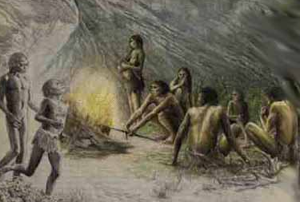Why did homo sapiens survive while Neanderthals didn’t? Thriller novelist Lee Child wrote not long ago that it was because homo sapiens developed language.
“But then something strange happened,” Child wrote. “We invented fiction. We started talking about things that hadn’t happened to people that didn’t exist.”
Speculating, based on various bits of evidence, that storytelling may be 100,000 years old, Child asked: “Why? Why tell stories?” Noting that “no new behavior could possibly become established unless, at least to some slight degree, it made it more likely that we would still be alive in the morning,” Child argued that storytelling kept homo sapiens alive “by managing our fear.” The thinking, Child posited, may have gone like this:
“Things happen to people like you, but they’re survivable. In other words — don’t worry. Things turn out OK.”
Similarly, Jeremy McCarter writes in a Newsweek essay:
An ability to invent and absorb stories … would have helped early humans work out “what if” scenarios without risking their lives, pass along survival tips and build capacities for understanding other people around the campfire. The best storytellers and best listeners would have had slightly greater odds of survival, giving future generations a higher percentage of good storytellers and listeners, and so on.
Then storytelling bolstered human progress: “We started telling stories about clan members who ventured out of the valley and came back a week or a month or a year later with tales of what lies beyond the hill. We legitimized exploration, and adventure, and progress,” Child wrote.
Just another reason to love storytelling.
